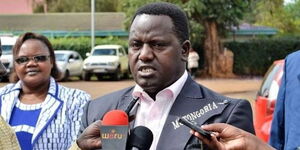President William Ruto has fired back at the People Daily newspaper with a subtle jab after a hard-hitting headline on Thursday.
The newspaper carried a front-page story titled ‘State House: No Longer Sacred Grounds’ and a short caption saying, “The House on the Hill, once shrouded in secrecy, now hosts every Tom, Dick and Harry in Ruto's quest to garner support.”
In response through his social media platforms, President Ruto wrote, “Bottom up it is.”
While addressing a Senate sitting in Mombasa, Ruto elucidated on the matter, adding, "Those who write newspapers want us to believe that the State House is an ivory tower. I want to tell them that it is the people's place. I believe in bottom-up; that is why ordinary citizens nowadays find their way to the State House."
This message referencing his bottom-up mantra was received with mixed reactions, with some viewing it as a misinterpretation of the story.
The article borrows from the recent increase in visitors at the State House, Nairobi, which in August alone hosted at least three meetings with what some regard as ‘Wanjiku’.
On August 7, Ruto hosted hundreds of boda boda officials from all sub-counties in what was described as a meeting with “legitimate entrepreneurs” and proposed an amnesty for motorcycles detained by police when not involved in activities against the law.
Just two days later, on August 9, the President opened the gates of State House for hundreds under what was said to be the Nairobi County Empowerment Programme.
During the meeting, Ruto handed over motorcycles, tailoring machines, salon and barbershop kits, juice vending machines, egg trolleys, rickshaws, pool tables, large-format printers, street photography equipment, wood-cutting machines, posho mills, industrial ovens, welding machines, and carpet-washing machines, among others.
Following the meeting, which drew much discussion online, Ruto fired back at critics who once again argued that he had lowered the standards of the important seat of power.
He said, “I haven’t lowered State House standards, but raised access for ordinary citizens,” adding, “Every person matters for equality in Kenya.”
Ruto emphasised inclusion, even remarking, “even boda boda [operators] are around,” and stressed that it is not wrong for ordinary Kenyans to be there.
The Head of State has faced sustained negative coverage, especially from The Standard newspaper, much to his frustration and that of his allies.
In what is quickly becoming a norm, the government, through various senior officials, including Cabinet Secretaries, often fires back at publications over what they view as unfair headlines.
In April, The Standard ran a front-page splash likening Ruto’s political pact with Raila Odinga to a betrayal of Kenya’s founding ideals, a reference to Judas Iscariot. The newspaper described the country's founding vision as “squandered at the altar of political expediency, impunity, and personal gain.”
And just as you might have guessed, Ruto did not keep quiet. Speaking at an Easter service in Ntulele, Narok County, on April 20, he dismissed the notion as “shameful and tragic”, accusing the media narrative of aligning with a devilish message that sought to undermine unity.
He framed the unity with Raila as “divine and God-ordained”, urging unity as a source of national blessing, not betrayal.
No one knows whether the tit for tat will end, but if the last few months are any indicator, the government will not relent from pushing back against what they feel is unfair coverage.












